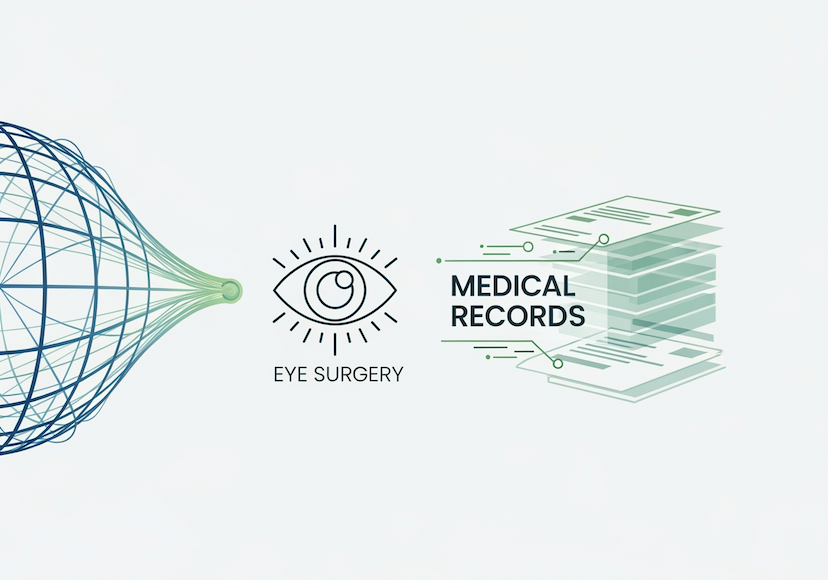
Latest Global Innovations in Eye Surgery Now Available in India
16 Nov, 2025
 Healthtrip
Healthtrip- What are the Latest Global Innovations in Eye Surgery?
- Why are these Innovations Now Available in India?
- Who Can Benefit from These Advanced Eye Surgeries?
- Where are these Advanced Eye Surgeries Performed in India?
- How are these Innovative Eye Surgeries Performed?
- Examples of Global Eye Surgery Innovations in India
- Conclusion
Advanced Cataract Surgery
Cataract surgery has undergone a revolutionary transformation thanks to advancements in technology. Phacoemulsification, a technique that uses ultrasound energy to break up the cloudy lens, is now more precise and efficient than ever before. Femtosecond laser-assisted cataract surgery (FLACS) takes it a step further, employing a laser to create precise incisions and fragment the cataract, reducing the need for manual intervention. This translates to improved accuracy, faster healing, and reduced risk of complications. Furthermore, the development of advanced intraocular lenses (IOLs) allows for personalized vision correction. Multifocal IOLs can correct both near and distance vision, potentially eliminating the need for glasses altogether. Toric IOLs, on the other hand, address astigmatism, ensuring sharper vision at all distances, and imagine waking up and seeing the world around you in crystal clear detail. Healthtrip can guide you to the best hospitals in India, such as Fortis Hospital, Noida, where experienced surgeons can help you explore these advanced options and determine the best solution for your individual needs.
Most popular procedures in India
Refractive Surgery Innovations
Say goodbye to glasses and contact lenses with the latest advancements in refractive surgery! LASIK, SMILE, and other refractive procedures are now safer and more effective than ever before. SMILE (Small Incision Lenticule Extraction) is a minimally invasive procedure that corrects nearsightedness by removing a small lenticule of tissue from the cornea, through a small incision, preserving the corneal strength and reducing dry eye symptoms. Advanced excimer laser technology allows for highly customized LASIK procedures, tailoring the treatment to your unique corneal shape and refractive error. These procedures are performed with incredible precision, thanks to sophisticated eye-tracking systems and wavefront technology. Healthtrip can help you find expert ophthalmologists at hospitals like Max Healthcare Saket, who can assess your candidacy for refractive surgery and help you achieve your vision goals. Imagine the freedom you'll have to pursue your passions without the hassle of corrective eyewear, it’s an experience worth investing in!
Wellness Treatments
Give yourself the time to relax
Lowest Prices Guaranteed!

Lowest Prices Guaranteed!
Glaucoma Treatment Breakthroughs
Glaucoma, a leading cause of irreversible blindness, is now being managed with innovative surgical techniques. Minimally invasive glaucoma surgery (MIGS) has emerged as a game-changer, offering a safer alternative to traditional glaucoma surgery. MIGS procedures involve implanting tiny devices to enhance fluid drainage from the eye, reducing intraocular pressure and preventing further optic nerve damage. These procedures often require minimal recovery time and have a lower risk of complications compared to traditional glaucoma surgery. Furthermore, advancements in diagnostic imaging allow for earlier detection and more precise monitoring of glaucoma progression. Healthtrip can connect you with leading glaucoma specialists at hospitals, such as Fortis Escorts Heart Institute, who are skilled in performing these advanced procedures. Early diagnosis and effective treatment are crucial for preserving your vision and maintaining your quality of life, so reach out to us today.
Corneal Transplantation Advancements
Corneal transplantation has witnessed remarkable progress, thanks to innovative techniques like Descemet's stripping automated endothelial keratoplasty (DSAEK) and Descemet's membrane endothelial keratoplasty (DMEK). These selective corneal transplantation procedures replace only the diseased layer of the cornea, preserving the healthy tissue and promoting faster healing. DMEK, in particular, involves transplanting an extremely thin layer of donor tissue, resulting in excellent visual outcomes and reduced risk of rejection. Artificial cornea (keratoprosthesis) is also available now for patients who are not suitable for traditional corneal transplantation and these are improving the lives of many patients with corneal blindness. At Healthtrip, we understand the anxieties associated with corneal transplantation, and we're here to support you every step of the way. Our network includes hospitals like Fortis Memorial Research Institute, Gurgaon, with experienced corneal surgeons who can assess your suitability for these advanced procedures and provide personalized care, with a focus on restoring your vision and improving your overall well-being.
Retinal Surgery Innovations
Retinal diseases, such as diabetic retinopathy and macular degeneration, can now be treated with advanced surgical techniques such as microincision vitrectomy surgery (MIVS) which involves small incisions, resulting in less discomfort and faster recovery. This surgery can be used to treat a variety of retinal problems, like epiretinal membranes, macular holes, and retinal detachments. Furthermore, retinal implants and gene therapies are emerging as promising treatments for inherited retinal diseases, offering hope for patients who were previously considered untreatable. These innovative therapies, coupled with precision laser treatments and targeted drug delivery systems, are revolutionizing the management of retinal diseases. Healthtrip is committed to bringing you the latest information on these breakthroughs. We can connect you with experienced retinal specialists, like those at Max Healthcare Saket, who can provide personalized treatment plans tailored to your specific condition, giving you the best possible chance of preserving your vision, because we believe everyone deserves the chance to see the world in all its glory, don't you?
What are the Latest Global Innovations in Eye Surgery?
The world of ophthalmology is constantly evolving, with groundbreaking innovations emerging at a rapid pace, offering hope and improved vision to millions. From laser technology to advanced lens implants and robotic-assisted procedures, the landscape of eye surgery has transformed dramatically. One of the most significant advancements is the femtosecond laser, employed in procedures like LASIK and cataract surgery. This laser allows for precise and customized corneal incisions, leading to faster healing times and improved visual outcomes. Imagine a world where blurry vision is a thing of the past thanks to these incredibly accurate lasers! In the realm of cataract surgery, multifocal and accommodating intraocular lenses (IOLs) are revolutionizing the way we correct vision after cataract removal. These advanced lenses not only restore clarity but also reduce or eliminate the need for glasses, offering patients a life free from visual aids. Picture yourself enjoying sharp vision at all distances – reading a book, driving a car, or watching a movie – without ever reaching for your glasses. These are just a few of the amazing advancements that are changing lives. The innovation continues to push boundaries, promising even better solutions and a brighter future for eye care. Hospitals like Breyer, Kaymak & Klabe Augenchirurgie in Germany are at the forefront, offering cutting-edge technologies and expertise.
SMILE (Small Incision Lenticule Extraction)
Beyond LASIK, another refractive surgery technique called SMILE (Small Incision Lenticule Extraction) is gaining popularity. SMILE involves using a femtosecond laser to create a small, lens-shaped piece of tissue (lenticule) within the cornea, which is then removed through a tiny incision. This minimally invasive procedure boasts advantages like reduced risk of dry eye and corneal nerve damage, offering a gentler alternative for vision correction. Think of it as keyhole surgery for your eyes! Furthermore, research into gene therapy and regenerative medicine holds incredible promise for treating inherited retinal diseases and even restoring vision lost due to conditions like macular degeneration. Scientists are exploring ways to deliver therapeutic genes directly to the eye or to regenerate damaged retinal cells, potentially reversing vision loss and preventing blindness. This is truly revolutionary stuff, offering a glimpse into a future where even the most challenging eye conditions can be effectively treated. The investment and dedication of researchers and clinicians across the globe are constantly expanding the boundaries of what's possible in eye care.
Why are these Innovations Now Available in India?
India has emerged as a global hub for medical tourism, and the availability of advanced eye surgery innovations is a testament to its rapidly evolving healthcare landscape. Several factors contribute to this phenomenon. Firstly, a growing number of skilled and experienced ophthalmologists in India are trained in the latest surgical techniques. Many Indian doctors pursue fellowships and training programs abroad, bringing back expertise in cutting-edge procedures. This international exposure ensures that Indian patients have access to the same level of care as patients in developed countries. Secondly, increasing investment in healthcare infrastructure by both public and private sectors has led to the establishment of state-of-the-art eye clinics and hospitals equipped with the latest technologies. Hospitals like Fortis Shalimar Bagh and Max Healthcare Saket are equipped with advanced diagnostic and surgical equipment, allowing them to offer advanced treatments.
Cost-Effectiveness and Accessibility
Moreover, the cost-effectiveness of medical procedures in India compared to Western countries makes it an attractive destination for patients seeking advanced eye surgery. This affordability, coupled with the availability of skilled professionals and advanced technology, has made India a preferred choice for medical tourists. Healthtrip plays a vital role in connecting international patients with leading hospitals and surgeons in India, facilitating access to these innovative treatments. Furthermore, the Indian government's initiatives to promote medical tourism, such as streamlined visa processes and accreditation of hospitals, have further boosted the growth of the healthcare sector. It's not just about the technology; it's about making it accessible to those who need it most. The commitment to providing world-class eye care at affordable prices has propelled India to the forefront of global ophthalmology.
Who Can Benefit from These Advanced Eye Surgeries?
The range of individuals who can benefit from advanced eye surgeries is incredibly broad, encompassing those with common refractive errors to those with complex eye diseases. Individuals suffering from nearsightedness (myopia), farsightedness (hyperopia), and astigmatism can achieve clearer vision through procedures like LASIK, SMILE, and PRK. These surgeries reshape the cornea, allowing light to focus properly on the retina, resulting in improved visual acuity. Imagine waking up every morning and seeing the world in sharp focus, without the need for glasses or contact lenses! Patients with cataracts, a clouding of the natural lens of the eye, can benefit from advanced cataract surgery techniques involving the implantation of multifocal or accommodating IOLs. These lenses not only restore clear vision after cataract removal but also correct presbyopia (age-related loss of near vision), reducing or eliminating the need for reading glasses. For individuals with glaucoma, a condition that damages the optic nerve, minimally invasive glaucoma surgeries (MIGS) offer a less invasive approach to lower intraocular pressure and prevent further vision loss. These procedures can help to preserve vision and improve the quality of life for glaucoma patients. Fortis Memorial Research Institute, Gurgaon offers comprehensive eye care solutions.
Treating Complex Conditions
Furthermore, advancements in retinal surgery have revolutionized the treatment of conditions like diabetic retinopathy, age-related macular degeneration (AMD), and retinal detachment. Techniques like vitrectomy, laser photocoagulation, and intravitreal injections of anti-VEGF medications can help to stabilize vision and prevent further damage in these sight-threatening conditions. For individuals with corneal diseases like keratoconus, corneal transplantation and collagen cross-linking can restore corneal shape and improve vision. These procedures can help to prevent vision loss and improve the quality of life for patients with corneal disorders. In essence, whether you're struggling with blurry vision, cataracts, glaucoma, or a complex retinal condition, advanced eye surgeries offer a wide range of solutions to improve your vision and enhance your overall well-being. It's about empowering you to see the world clearly and live life to the fullest.
Also Read:
Where are these Advanced Eye Surgeries Performed in India?
India has rapidly become a global hub for medical tourism, and advanced eye surgeries are no exception. Several leading hospitals across the country are equipped with state-of-the-art technology and staffed by highly skilled ophthalmologists who have been trained in the latest surgical techniques. These facilities offer a range of innovative procedures, attracting patients from around the world seeking world-class eye care at competitive prices. Metropolitan cities such as Delhi, Mumbai, Chennai, and Bangalore boast numerous eye hospitals that have invested heavily in advanced diagnostic and surgical equipment. For instance, Fortis Memorial Research Institute in Gurgaon and Max Healthcare Saket in New Delhi are renowned for their comprehensive eye care services, including advanced cataract surgery, refractive surgery, and treatments for glaucoma and retinal disorders. These hospitals prioritize patient comfort and safety, ensuring a seamless and positive experience for those undergoing treatment. Furthermore, the availability of experienced support staff and advanced post-operative care contributes to the high success rates of these surgeries.
Beyond the major metropolitan areas, several other cities are also emerging as centers for advanced eye care. Hospitals in cities like Hyderabad, Ahmedabad, and Pune are increasingly offering specialized eye surgery services with a focus on personalized treatment plans. These hospitals often collaborate with international institutions to stay abreast of the latest advancements in ophthalmology. Additionally, the presence of dedicated eye clinics and specialized centers in smaller towns and cities ensures that advanced eye care is becoming more accessible to a wider segment of the population. This decentralization of healthcare services is a positive trend, as it reduces the burden on major metropolitan hospitals and makes it easier for patients from various regions to access the treatment they need. Choosing the right facility is paramount, and resources like Healthtrip can assist patients in finding the most suitable hospital and specialist for their specific eye condition and treatment requirements, ensuring they receive the best possible care.
How are these Innovative Eye Surgeries Performed?
Innovative eye surgeries leverage cutting-edge technologies and techniques to enhance precision, minimize invasiveness, and improve patient outcomes. Laser-assisted cataract surgery, for example, utilizes femtosecond lasers to create precise incisions and fragment the cataract, making it easier to remove. This method reduces the reliance on manual techniques and can lead to faster recovery times and reduced risk of complications. Similarly, refractive surgeries like LASIK and SMILE employ excimer lasers to reshape the cornea, correcting refractive errors such as nearsightedness, farsightedness, and astigmatism. These procedures are performed with exceptional accuracy, often resulting in improved vision and reduced dependence on glasses or contact lenses. The use of advanced imaging technologies, such as optical coherence tomography (OCT) and corneal topography, allows surgeons to create detailed maps of the eye, guiding them during the surgical process and ensuring optimal results. Moreover, minimally invasive glaucoma surgeries (MIGS) have revolutionized the treatment of glaucoma by offering safer and less disruptive alternatives to traditional glaucoma surgery. These procedures involve the implantation of tiny devices to lower intraocular pressure, helping to prevent further damage to the optic nerve.
The implementation of robotic-assisted surgery in ophthalmology is also gaining traction, offering the potential for even greater precision and control. While still in its early stages, robotic systems can assist surgeons in performing delicate procedures, such as retinal surgery, with enhanced stability and dexterity. Furthermore, advancements in intraocular lens (IOL) technology have significantly improved the outcomes of cataract surgery. Multifocal and accommodating IOLs can correct both near and distance vision, reducing the need for reading glasses after surgery. Toric IOLs, on the other hand, can correct astigmatism, providing clearer vision for patients with this condition. The combination of advanced surgical techniques, sophisticated imaging technologies, and innovative medical devices is transforming the landscape of eye surgery, making it possible to treat a wide range of eye conditions with greater efficacy and safety. Healthtrip facilitates access to these advanced procedures by connecting patients with leading eye specialists and hospitals that offer the latest treatments. For example, Breyer, Kaymak & Klabe Augenchirurgie in Germany is known for its advanced refractive surgery options.
Examples of Global Eye Surgery Innovations in India
India has embraced global eye surgery innovations with remarkable enthusiasm, integrating these advancements into its healthcare system to benefit a large population. One prominent example is the widespread adoption of Femtosecond Laser-Assisted Cataract Surgery (FLACS). Hospitals like Fortis Memorial Research Institute and Max Healthcare Saket have invested in femtosecond laser platforms, enabling surgeons to perform cataract surgery with enhanced precision and predictability. This technology allows for more accurate corneal incisions, capsulotomies (creating a circular opening in the lens capsule), and lens fragmentation, resulting in improved visual outcomes and faster recovery for patients. Another significant advancement is the use of minimally invasive glaucoma surgery (MIGS) techniques. These procedures, such as the implantation of iStent or Hydrus Microstent, are gaining popularity in India as they offer a safer and less invasive alternative to traditional glaucoma surgery. MIGS procedures can effectively lower intraocular pressure, reducing the risk of further optic nerve damage and vision loss in patients with glaucoma. Indian ophthalmologists are also increasingly utilizing advanced imaging technologies like optical coherence tomography (OCT) angiography to diagnose and manage retinal diseases such as diabetic retinopathy and age-related macular degeneration.
Furthermore, refractive surgery innovations, including SMILE (Small Incision Lenticule Extraction), have become increasingly available in India. SMILE is a minimally invasive procedure that corrects myopia (nearsightedness) by removing a small lenticule of corneal tissue through a tiny incision. This technique offers several advantages over traditional LASIK, including reduced risk of dry eye and corneal flap complications. Leading eye hospitals in India are also offering advanced intraocular lens (IOL) options, such as multifocal and extended depth of focus (EDOF) lenses, to cataract patients. These lenses can provide a wider range of vision, reducing the need for glasses after cataract surgery. The adoption of these global innovations in India is driven by a combination of factors, including the increasing demand for high-quality eye care, the availability of skilled ophthalmologists, and the growing affordability of advanced technologies. Hospitals like Fortis Escorts Heart Institute also offer a comprehensive suite of eye care services. Healthtrip plays a crucial role in connecting patients with these cutting-edge treatments and ensuring they receive the best possible care.
Also Read:
Conclusion
The world of eye surgery is undergoing a remarkable transformation fueled by continuous innovation and technological advancements. From laser-assisted cataract surgery to minimally invasive glaucoma treatments and advanced refractive procedures, these innovations are enhancing the precision, safety, and effectiveness of eye care. India has emerged as a prominent destination for these advanced eye surgeries, with leading hospitals offering state-of-the-art treatments at competitive prices. The availability of skilled ophthalmologists, coupled with the increasing affordability of advanced technologies, has made it possible for a larger segment of the population to benefit from these innovations. As technology continues to evolve, we can expect even more groundbreaking advancements in eye surgery, offering hope and improved vision to millions of people worldwide. Healthtrip is committed to staying at the forefront of these developments, connecting patients with the latest treatments and ensuring they receive the best possible care. Whether you are seeking cataract surgery, refractive correction, or treatment for glaucoma or retinal disorders, Healthtrip can guide you through the process and help you find the right specialist and facility for your specific needs. Explore options like Saudi German Hospital Cairo, Egypt for comprehensive care.
The journey towards better vision is now more accessible than ever, thanks to the convergence of global expertise and technological prowess. As we look to the future, it's clear that the field of ophthalmology will continue to push boundaries, offering innovative solutions that improve the quality of life for individuals around the globe. With platforms like Healthtrip, accessing these advancements becomes seamless, ensuring that patients receive timely and effective care tailored to their unique circumstances. By staying informed and proactive, you can take control of your eye health and embark on a path towards clearer, brighter vision. Remember, your vision is invaluable, and investing in the best possible care is an investment in your overall well-being. Consider facilities like Vejthani Hospital in Thailand, known for its comprehensive medical services, as you plan your health journey.
Related Blogs

Common Myths About Eye Surgery Doctors Bust Them
Explore evaluations, innovations, hospital comparisons, and global success insights for

How Healthtrip Coordinates Cross-Border Medical Records for Eye Surgery
Explore evaluations, innovations, hospital comparisons, and global success insights for

Top Pre-Surgery Tests Required for Eye Surgery
Explore evaluations, innovations, hospital comparisons, and global success insights for

Why India Leads in Affordable Eye Surgery Analysis
Explore evaluations, innovations, hospital comparisons, and global success insights for

Patient Satisfaction Scores for Eye Surgery at Healthtrip Partner Hospitals
Explore evaluations, innovations, hospital comparisons, and global success insights for

How to Choose the Right Hospital for Eye Surgery Using Healthtrip's Criteria
Explore evaluations, innovations, hospital comparisons, and global success insights for










